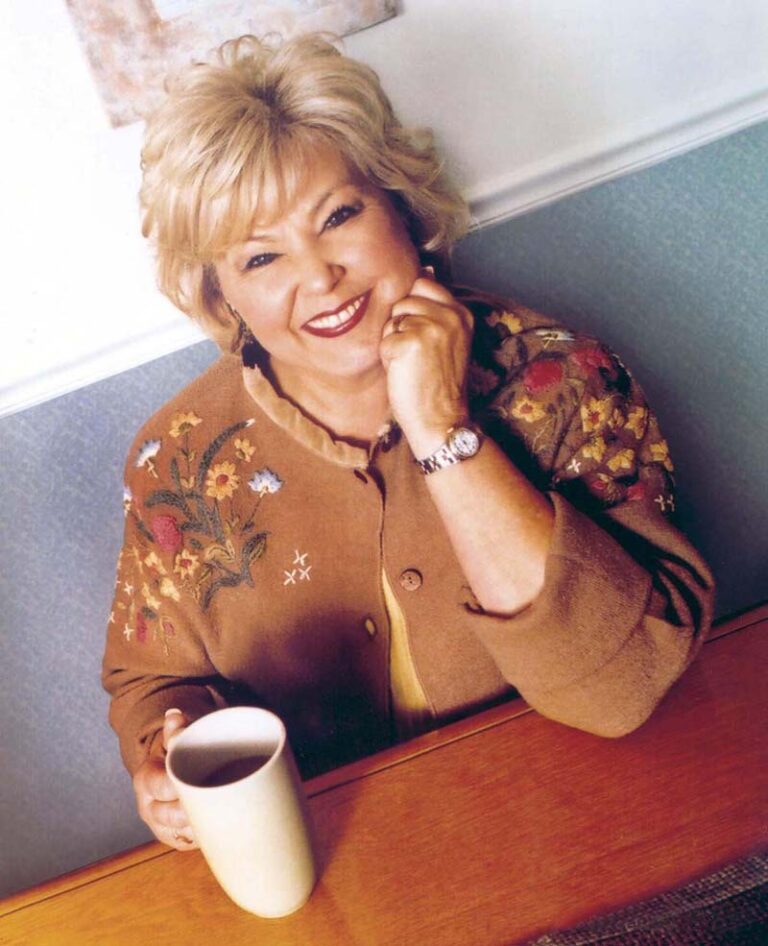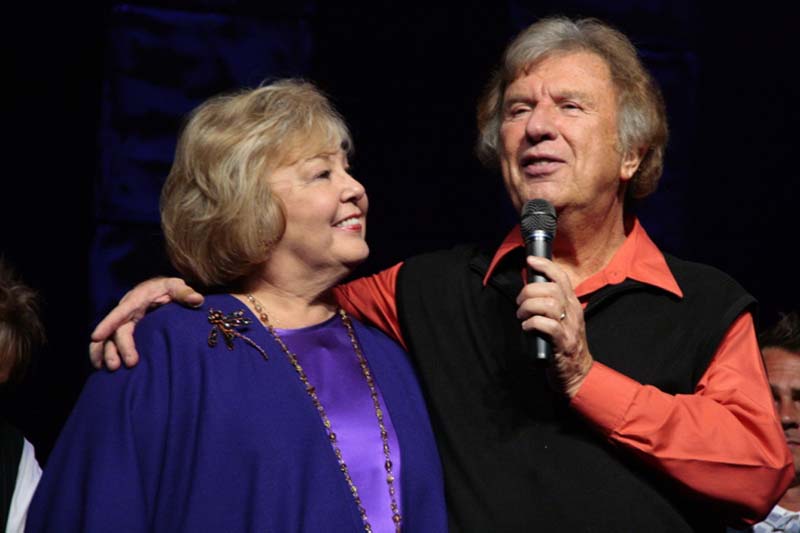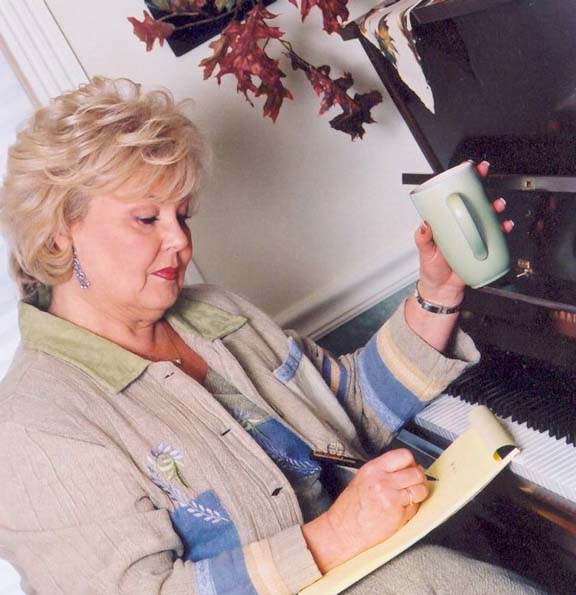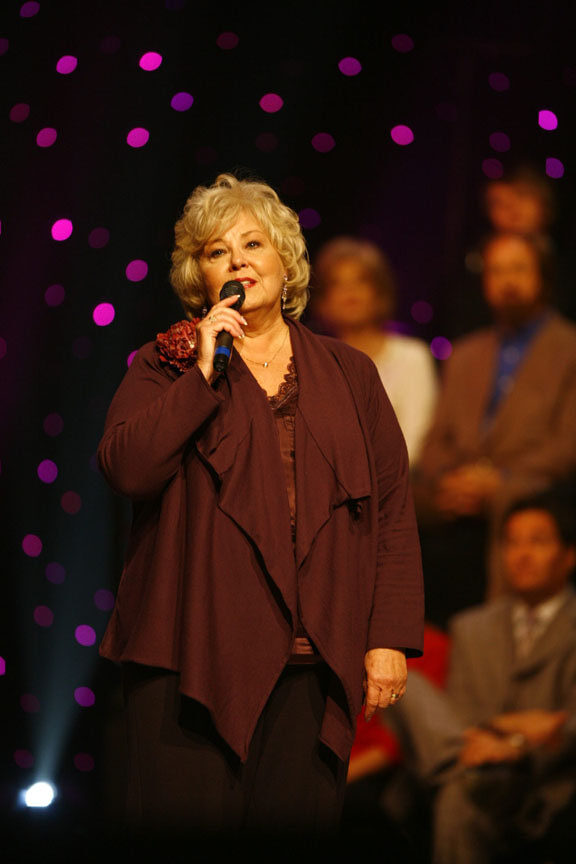Gloria Gaither: Keeping an Eternal Perspective
By Karen Brewer, Publisher & Editor

They gave themselves away for things that last forever.
For more than half a century, Bill and Gloria Gaither have dedicated their lives to the eternal values of their Christian faith, using their talents to glorify God.
“Because He Lives,” “He Touched Me,” “Thanks to Calvary,” “Going Home,” “The Longer I Serve Him,” “Something Beautiful,” “There’s Something About That Name,” “The King is Coming,” “It Is Finished,” “Sinner Saved by Grace,” “Then Came the Morning,” “Forgiven Again” are just a few of the more than 700 songs thus far in the life’s journey of Gloria and Bill Gaither.
In an interview with The Christian View magazine, Gloria Gaither explained that words have been important to her since childhood. Her father, Lee Sickal, a Michigan pastor, and her mother, Dorothy Sickal, a poet, writer, speaker, and painter, encouraged their talented young daughter. “I was probably a generation ahead, as far as women doing what God called them to do,” said Gloria. “It never occurred to me that it had anything to do with gender, until I left home and got into the world. My parents had never said to me that I couldn’t do anything because I was a girl, or that I couldn’t do anything for any reason. In fact, they taught me, from the time that I could breathe, that God had gifted me and called me, and that I would stand before Him one day and would give an account of the gifts He had given me.”
Her husband grew up on an Indiana farm. In addition to farming, Bill Gaither’s father, George Gaither, worked the night shift at a General Motors plant. Bill’s mother, Lela Gaither, would sing and play the piano with her children. “His mom had an artistic heart, and she loved poetry and was very tenderhearted,” said Gloria. “Although her parents were very poor, they made sure she had piano lessons.” Bill spent his childhood listening to Southern Gospel quartets and family groups on the radio, even listening to a radio in the barn while milking cows. He would pretend to broadcast to neighbors from his farmhouse’s upstairs window. His parents encouraged their son’s interest, taking the family to see and hear in person the very groups Bill listened to on the radio, whether to the Ryman Auditorium in Nashville, the Quartet Convention in Memphis, or the singings at the Cadle Tabernacle in Indianapolis. Bill learned the words to his favorite songs and taught his younger brother and sister to sing.
In college, Bill minored in music and majored in English.
Gloria majored in English as well as French and sociology, preparing, she thought, to be a missionary to Africa. “I finally got there when we did the South African Homecoming taping,” she noted.
Gloria would later earn her master’s degree in literature, and Bill would earn his master’s degree in guidance and counseling.
Bill and Gloria met when she was 19 and a junior at Anderson College (now Anderson University) in Anderson, Indiana. Her French professor had asked her to teach three classes at Alexandria High School, to assist a French teacher who would be absent due to cancer surgery. Bill, who had taught junior high school English for three years, began that same week as head of the high school English department. When he introduced himself, she answered, “Oh, yes. You’re the one who has a brother that my friend is dying to meet.” He responded – ‘That’s the story of my life. Everyone wants to meet my brother.’
Bill and Gloria’s talks in the hallways led to lunch and basketball games, and their courtship led to a marriage proposal. They were married the following year, on December 22, 1962.
While engaged, Bill played for Gloria some Gospel songs he had written, and she showed him some of her poetry. That would be the beginning of a successful collaboration that has endured for many years, has inspired generations, and has led to many Dove awards; Grammy awards; Songwriter of the Century award from the American Society of Composers, Authors, and Publishers (ASCAP); and induction into the Gospel Music Hall of Fame and Museum.
They began writing songs together in the early years of their marriage, while Bill taught English and Gloria taught English and French at Alexandria High School, and Bill also served as Minister of Music at South Meridian Church in Anderson. Their writing was expressed in response to a sermon or to a truth they had learned from Scripture or from their own lives. They would ‘try out’ their songs on the choir during Wednesday night choir rehearsals. “I grew up writing, and, in high school, I entered speech contests and wrote poetry and various things,” Gloria said. “I never thought about being a lyricist until I met Bill, but it seemed to be natural, as our life developed, that I became the lyricist, and he became the composer.”

She wrote in her book Because He Lives that writing, which is, in essence, creating, is not always an easy task: “It is not always easy to bare one’s soul on paper, in a song, or before a group of people. Sometimes, the concepts that seem the most profound to us have had to be learned with great difficulty and have really cost us in terms of commitment and struggle. These lessons become very special and dear, and sometimes we want to hold them close and savor them for ourselves. Sometimes, it is fear that makes us hesitant to share an idea. Some of the things the Holy Spirit has taught us we know will not be popular, because they demand so much or because they expose shoddiness in the lives of those who carefully maintain a façade of religiosity. In our humanness, it is easy to shrink from including those concepts in a song or book for fear someone will be displeased or critical. It is easy to smart from the criticism and become gun-shy about including such experiences when we share the story of what Christ can do. There is nothing that makes one quite so vulnerable as creating. The artist or writer must put all there is of himself into his work. Often, those who have never dared to take such a risk are usually the severest critics. They are often the ones to analyze and dissect every flaw and pick apart and ‘read into’ a writer’s intentions. But the Lordship of Christ demands that we praise God by daring to hold our ideas and thoughts with an open hand, realizing that we are all still ‘kids under construction’, and ‘the Lord might not be finished yet.’ One day, He will no doubt lead us yet beyond the lessons we are now learning, but in the meantime we must be willing to share the struggle and victories of our pilgrimage along the way, reaching always toward the ways that are higher than our ways and ‘His thoughts that are above our thoughts.’”
As Gloria wrote in her book Something Beautiful, writing is a passion and is as vital as breathing to those who create: “Writers write because they have no choice. For a writer, a seed of truth lodges somewhere in the soul, and she or he can’t stop its growth any more than a mother can stop the growth of the child she has conceived. It must be – it will be – delivered to the world. And the writing of a thing is just the beginning. Like a baby, if it is to survive, it must be shaped and disciplined and nurtured to maturity. It may then be accepted or rejected, but the writer has delivered it full-blown into the world. That is the writer’s job; that is the writer’s passion.”
She wrote Something Beautiful, which chronicles stories behind the creation of 75 of their most beloved songs, because they have been asked so often for those stories. “Some songs come because of feeling a need to write on a particular theological topic,” she told The Christian View magazine. “Probably the biggest reason, I think, is that God has led us, and we have discovered truths that have worked in our families and in our lives that tended to produce a song.”
In their early years together, Bill and Gloria partnered with Bill’s brother, Danny, and recorded numerous albums as The Bill Gaither Trio, a group that had formerly included Bill’s sister, Mary Ann. While Gloria sings beautifully, she considers herself a writer, rather than a singer. “I sang in church with my sister,” she said of her childhood days. “I don’t consider myself a singer, even today. I do feel comfortable in the role of communicator, whether in speaking or in writing. I’m comfortable with words. But I didn’t grow up as a musician, and I didn’t major in music.”
Danny Gaither ventured into solo work and recorded several projects as a soloist. “Danny was a fabulous singer,” Gloria said of the acclaimed Gospel tenor who became like a brother to her. The retired schoolteacher served as Minister of Music for his home church, and he was inducted into the Gospel Music Hall of Fame in 1999, two years before his death from lymphoma.
Death would often touch the lives of Bill and Gloria, whether the deaths were of family or the Gospel music pioneers who became family through the Homecoming video series.
Gloria explained to The Christian View magazine how that first Homecoming video, which launched a video series phenomenon and Homecoming tours, was made by accident in 1991.
The Gaither Vocal Band had recorded an album that paid tribute to and included voices of Southern Gospel music pioneers. “We had a 25-year career with the Gaither Trio, but I would call us inspirational, middle of the road, and the Vocal Band had been more contemporary than the Trio,” she said. “So, it was kind of interesting that they decided that they would like to go back and do a Southern Gospel flavored album, and invite some of their heroes to come and sing on one song, “Where Could I Go But to the Lord?”.
“It wasn’t a video. We had never done video. In fact, we had stayed away from television quite a bit, although we had done the Billy Graham crusades.
“But a camera was present at the audio session. The camera was running, simply to get snippets of things that they were going to edit in to the actual recording of the song, for a three-minute dj cut for television dj’s. The camera basically ran five hours, because Bill was like a kid in a candy store, excited about having all of these people in one room.
“Of course, he knew every song they ever sang. For us, it has always been about the song—about great songs, finding great songs, in the first place, trying to write songs that had message and content and yet were accessible to everybody, a style simple enough that everybody could sing. So, it always has been about the song. He wanted to hear those people sing some of the great songs that needed to be preserved. But, that day, he just did that for fun, and the camera was running.
“He called me at the end of the day and said, ‘If that camera caught anything that went on in that room, I want a copy of it.’ So, he went to the record company and said, ‘What are you going to do with that tape?’ They said, ‘Well, we’re going to throw it away when we get our three-minute edit out.’ And he said, ‘Oh? Can I have it?’
“He brought it back to Anderson University. It was technically a nightmare, because it wasn’t intended to be a television taping. There weren’t television lights. There was only one camera. People had just walked in front of the camera, because it was just setting there to record hugs and eating and stuff they were going to splice into this three-minute song. He edited it down to 90 minutes, and spliced in stills and pictures of the groups and albums they had made, whatever he could.
“He called the program director we knew at CBN and said, ‘Surely, there is somebody else who would like to see this. If you’re interested in airing it as programming, we’ll offer it for sale, and, if anybody orders it, you’ll keep half for your tv time, and I’ll keep half to pay for my editing time.’ And the phone rang off the hook.
“That became known around our house as ‘the video’. The kids would say, ‘Are we going to see ‘the video’ again, Daddy?’
“He went to the record company and said, ‘I’d like to do this again, on purpose, and have lighting and several cameras.’
“In the beginning, it was all about preserving the great songs, the songs that shouldn’t die, experiencing these songs for another generation. Bill knew all of that history and was a ‘walking encyclopedia’ of it, because he loved it as a kid.
“As it developed, he decided to preserve especially the great groups and great cuts of songs. It just took off. Instead of that being a sort of wind-down album, which they thought it would be, it ended up reviving the careers of the pioneers.
“And, because we had a production company, and everything was there for them, they were physically able to do it. All they had to do was show up. They weren’t responsible for equipment and booking dates.
“It has always been a really good example of people who love each other.
“On the road, it’s been sweet traveling. We’ve had various groups, and we try to change the program from time to time. We’ve lost a lot of the older ones. But younger ones have come along, who have families. It’s a great bunch of travelers. They love each other. They help each other. They take care of each other’s kids. It’s really how the body of Christ is supposed to be. It’s like a home church.”

One Homecoming videotaping enabled Gloria to travel to South Africa, the place where, in her youth, she had longed to go to serve God as a missionary. “I had never been there, all of those years, even though I had thought I would end up being a missionary to Africa,” she said. “It’s interesting how God guides your life. When we went to South Africa, a lady about my daughter’s age said, ‘I want to tell you that I grew up with your songs. Your songs have been in Africa for 40 years.’ It was like God sent her.
“I actually told that in the concert when we went back to Johannesburg the second time. I don’t know who this girl was, but God sent her to me. He was basically saying, ‘I interrupted your life, with Bill and music, but I didn’t forget my call to Africa. You weren’t wrong about that. You have been to Africa better and longer than you would ever have, had you gone to one place.’ If I had gone, I would have served God the best I knew, and I would have given my life probably in some particular area of Africa. But God knew that my real gifts were in writing and communicating, and He moved me into this area that I never would have planned. I didn’t even know how to prepare for it, other than writing. And He gave me back Africa and lots of other places, because our songs have gone all over the world. I think that’s just like the Lord. He’s amazing to me.”
Gloria has produced a Homecoming Kids video series for children and has written many books for children. “I think our most important school and our most important church is the home,” she said. “That’s where you really learn to know God. You don’t learn just one hour on Sunday morning. I think that gathering with other believers is very important, and I’m not minimizing that at all, but you learn the most about life in your home. I wrote two books with Shirley Dobson about things for families to do together, making time count and making lasting memories, so that, when kids grow up, and they start parenting, they will have a resource of memories to draw from about what home is like.”
She, herself, has great memories from having written a book of poetry years ago with her mother and her two then-teenaged daughters.
Gloria has, in fact, written more than 40 books, for adults and for children.
She also has created greeting card lines, has a speaking ministry at conventions, women’s retreats, and universities, and helped create the Homecoming magazine with Bill.
She was formerly an adjunct professor of songwriting at her alma mater, Anderson University, which is one school among seven that have presented her with an honorary doctorate degree. Always a student of great literature, she has written and presented papers in academic settings on the writings of John Steinbeck. And she has served as a member of the Board of Directors for the Council for Christian Colleges and Universities and for the United Christian College Fund.
She keeps busy with Gaither Family Resources and Gaither Music Company, a Gospel music production company based in the Gaithers’ hometown of Alexandria.
She also keeps busy with her family. She and Bill have three grown children, Suzanne, Amy, and Benjy, and several grandchildren.
Family has always been most important to her. She called her only sibling, Evelyn Baylor, a wonderful sister and Evelyn’s husband, Dave, like a brother to her. She said that she and her sister were always close, “which, I think, is very unusual, for two siblings 10 years apart to be as close as we have been.” She called her sister her prayer warrior, and said that she has called Evelyn to ‘cry on her shoulder’, and called Evelyn “one of those people that you are at peace in her presence.”

Other family members who were strong influences in Gloria’s life included both of her grandmothers.
“I was influenced by a lot of people,” she added. “I was influenced by a lot of evangelists and missionaries and teachers and theologians who ate at our table. Our dining room table was probably the biggest influence outside of my parents and the immediate family, because I grew up listening to very deep and profound discussions of every topic from world affairs to theology to relationship building, because we kept all of the traveling people and the people who came to minister at our church. And we also kept a lot of pregnant teenagers and recovering alcoholics and people who just shouldn’t be alone.”
She also knew positive as well as negative influences in the small churches her father pastored. “There were so many saints, precious people, who would have died for me,” she said. “But you don’t learn just from the positive influences. In every church, you see people who are not living what they say. My parents did not hide me from that, and I’m thankful for that. I did see people who made bad choices and who had to live with tragic results of those choices. My parents used that as a time to teach, that there are consequences to our choices. Or they would point out someone in our church and say, ‘She is a saint, because she has chosen to follow God, no matter what. Her life has not been easy. She has had tragedy. She has had crisis. But God has worked for good in it all, because she has loved Him.’”
She wrote in Something Beautiful that she and her husband often nurture talented young artists, “not so much to help them ‘make it’, but in the hopes of teaching them some things that may save them from themselves when they do make it. In our culture, talent often results in what the world would call ‘success’, but it has been our experience that success is often much harder to deal with than failure. In fact, failure is often good for us human beings; we learn from our failures. We’re often destroyed by success. What we do when the stage is dark and bare is so much more important than what we do when it’s bright and full. When all is said and done, I hope our children and our parents, our neighbors, and the people with whom we work will see our praise lived out much more articulately than we are ever able to express in words and in print. May our failures and shortcomings be redeemed by the sweet love and grace of Jesus so that His spirit makes a more lasting memory than our fragile humanity.”
Gloria’s Christian faith has sustained her through difficult times. “I can’t even imagine life without the Lord,” she told The Christian View magazine. “Christians are not exempt from crises and hard times. I think that is erroneous theology, that, if you serve the Lord, you’re not going to get sick, and you’re not going to lose your job, and you’re going to have a better house and prosperity. I don’t think that’s biblical. Certainly, great saints and apostles didn’t experience that, and, if John and Peter and Paul didn’t experience it, then I don’t think that I will.
“The very things that seem to be so hard in life turn out to be the very things that shape us in our spiritual life. I often ask audiences, ‘Think of the time in your life when you grew the most, discovered the most about God, became closer to God, got more biblical insight, for how many was it a time when everything was going well? Let me see your hands.’ And I see almost no hands. And if I say, ‘For how many of you was it a time where you thought you couldn’t live through something, and it was really hard, a difficult crisis?’ And everybody raises their hands. That is really interesting, because we pray that God will remove from our lives the very things that are shaping us into His image.
“I think that one thing that comes through in the Homecoming videos, time and time again, is the perspective of seeing things from heaven’s point of view. If you see things from earth’s point of view, you’re going to see a dying planet, but, if you see things from heaven’s point of view, you’re going to see a planet that is waiting to be reborn. We’re living in a different kingdom that is coming more and more alive. Even death is only entry into real life, as opposed to living in a world that is dying.”
Eternal perspective is paramount. When prioritizing time and effort in doing something, she thinks that these questions should be asked – ‘Will it last forever? Does it have eternity in it? When they have breathed their last breath on earth, she wants this epitaph to describe the lives of Bill and Gloria Gaither: They gave themselves away for things that last forever.
